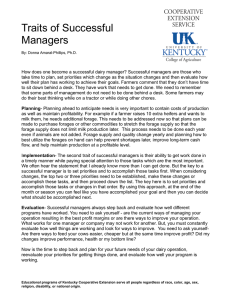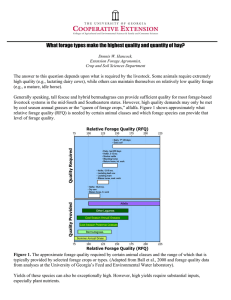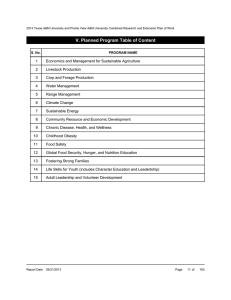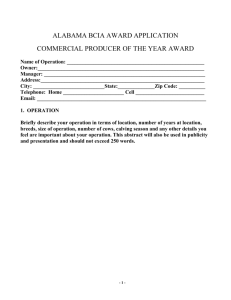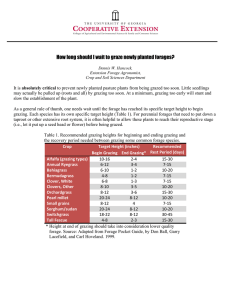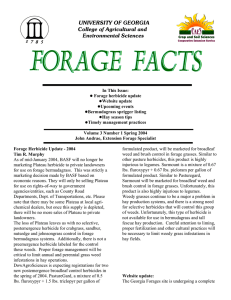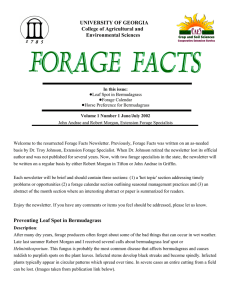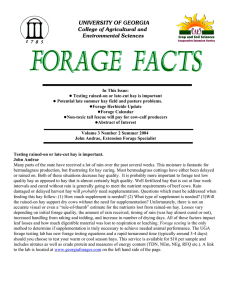THE UNIVERSITY OF GEORGIA College of Agricultural and Environmental Sciences
advertisement
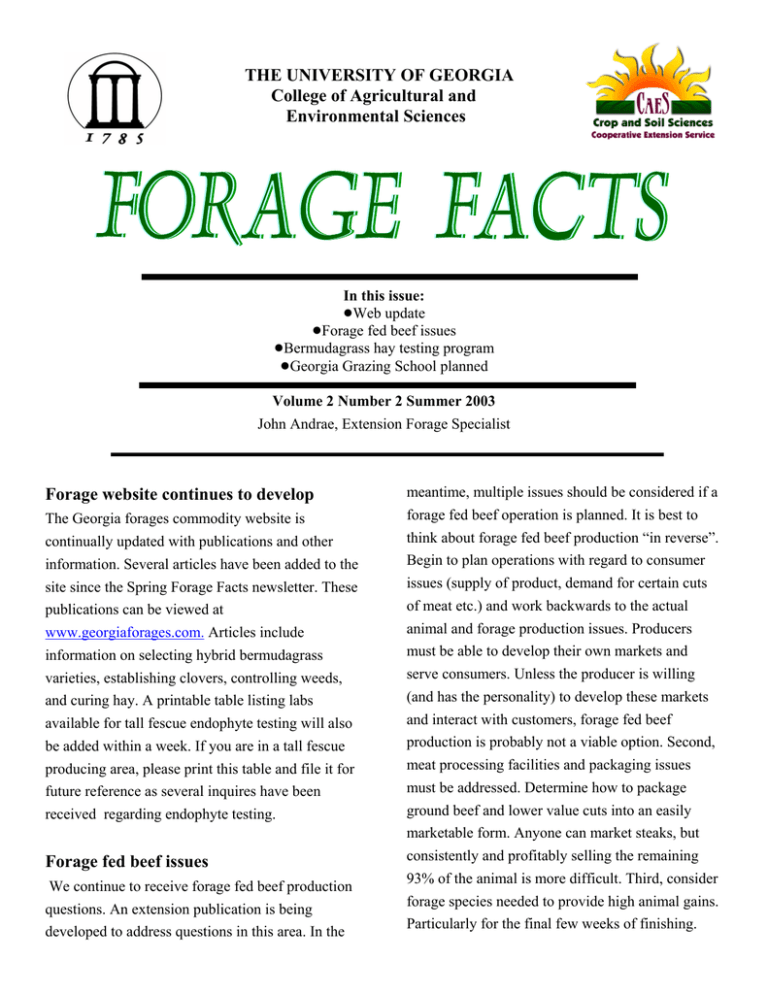
THE UNIVERSITY OF GEORGIA College of Agricultural and Environmental Sciences In this issue: !Web update !Forage fed beef issues !Bermudagrass hay testing program !Georgia Grazing School planned Volume 2 Number 2 Summer 2003 John Andrae, Extension Forage Specialist Forage website continues to develop meantime, multiple issues should be considered if a The Georgia forages commodity website is forage fed beef operation is planned. It is best to continually updated with publications and other think about forage fed beef production “in reverse”. information. Several articles have been added to the Begin to plan operations with regard to consumer site since the Spring Forage Facts newsletter. These issues (supply of product, demand for certain cuts publications can be viewed at of meat etc.) and work backwards to the actual www.georgiaforages.com. Articles include animal and forage production issues. Producers information on selecting hybrid bermudagrass must be able to develop their own markets and varieties, establishing clovers, controlling weeds, serve consumers. Unless the producer is willing and curing hay. A printable table listing labs (and has the personality) to develop these markets available for tall fescue endophyte testing will also and interact with customers, forage fed beef be added within a week. If you are in a tall fescue production is probably not a viable option. Second, producing area, please print this table and file it for meat processing facilities and packaging issues future reference as several inquires have been must be addressed. Determine how to package received regarding endophyte testing. ground beef and lower value cuts into an easily marketable form. Anyone can market steaks, but Forage fed beef issues We continue to receive forage fed beef production questions. An extension publication is being developed to address questions in this area. In the consistently and profitably selling the remaining 93% of the animal is more difficult. Third, consider forage species needed to provide high animal gains. Particularly for the final few weeks of finishing. Selecting a high quality forage is relatively easy or contact Dr. Paul Vendrell (706) 542-7690 or Dr. during spring months when winter annuals are John Andrae (706) 542-1529 for a copy to be available; however, finishing cattle on mailed to you. Georgia will be the first location in bermudagrass or bahiagrass in the summer without the country (if not the world) to develop and utilize grain supplementation and controlled grazing is these important NIRS digestibility equations for difficult if not impossible. Forage fed beef can be a warm season perennial grasses. Thanks in advance highly profitable enterprise, but is not for an for your help. average producer. Forage, cattle, and people management are critical! Georgia Grazing School planned We are currently planning a two day grazing school Bermudagrass hay testing program that will follow a similar format as Alabama, All of the hay testing labs across the Southeast use Kentucky and Missouri grazing schools. This similar equations to predict bermudagrass hay school will be a joint effort between The University quality. These equations are the best estimate of of Georgia Cooperative Extension Service and bermudagrass energy content that is available, but NRCS and is tentatively planned for October 20-21 are out of date and in need of revision. The in the Athens area. As in other states, a fee will be University of Georgia is currently developing charged to offset costs of this school. We’ll keep equations that will predict the digestibility of you posted on registration and other information as bermudagrass and bahiagrass hay using near it develops. The school will be limited to 35-40 infrared spectroscopy. At a cost of $10, these participants and will cover many aspects of plant equations will allow accurate prediction of warm and grazing management in detail. Both hands-on season grass digestibility and crude protein content and classroom training will be included. A copy of within 24 hours of sample receipt. Reports will be Southern Forages, a grazing school notebook, and given in a format that is easily understood and meals will be provided. If you are interested, please interpreted by producers. We are extremely excited block these dates out on your calendar and wait for about this technology and are asking that extension the registration form. offices work closely with hay producers to assist in developing and refining the new equations. Eventually we hope to refine these equations to the point that available crude protein (i.e. exclude heat bound protein) and possibly mold and other contaminants. We have received several samples so far, but additional samples would be helpful to further refine and validate these equations. Please assist us in getting these equations to an accurate and useful state. A submission form is available online at: “We will weigh the plots and analyze the data as http://aesl.ces.uga.edu/forms/nirdigest/NIRDigestibility.pdf usual. We do not make guesses as to which yielded best.”
